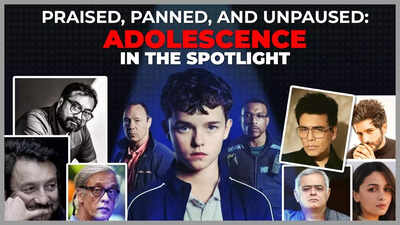
The
Netflix
limited series '
Adolescence
' has ignited extensive discussions within the global entertainment community, particularly among Indian filmmakers and audiences. The series' exploration of complex themes and its unconventional narrative approach have garnered both admiration and critique, prompting a deeper examination of creative liberties in storytelling. This discourse sheds light on the contrasting landscapes of artistic freedom between international productions and the Indian film industry.

Overview of 'Adolescence' and Its Reception
'Adolescence' is a four-part series that delves into the tumultuous journey of a 13-year-old boy accused of murdering a female classmate. The narrative intricately explores themes of toxic masculinity, the pervasive influence of social media, and the challenges of adolescent development. Its unique storytelling, characterized by episodes unfolding in single continuous shots, has captivated viewers and critics alike. The series has sparked significant conversations about the portrayal of youth and the societal factors influencing their behaviour.
Sharing his take on such ambitious technical storytelling, Vardhaan Puritold ETimes, "Speaking from my personal experience, ambitious storytelling and an actor’s experience on a project are directly proportional. The single shot format is a uniquely immersive experience that makes the viewers seamlessly transport themselves into a world of make believe. Great cinematic geniuses compare a cut in cinematic storytelling with an eye’s blink and obviously an eye that doesn’t blink is every cinephile’s dream. Adolescence and its quality of story telling and technical brilliance is a dream for any artist to associate with all across the world."
Praise from Indian Filmmakers
Prominent Indian filmmakers have expressed profound appreciation for 'Adolescence'
Shekhar Kapur lauded the series for redefining storytelling, emphasizing its deep character exploration and innovative narrative structure.Taking to his X account, he called Adolescence a "great series" with "next-level storytelling". He wrote, "it defies the regular three-act structure of cause and effect and plunges you deeply into the minds of the characters and allows you to reflect upon yourself."
Hansal Mehta shared a personal reflection, stating that the series prompted him to introspect as a parent and enhanced his understanding of his children. He described the experience as "terrified, concerned, and introspective—all at once and for a long time to come."
Anurag Kashyap praised 'Adolescence' but criticized Netflix India's leadership, calling them "dishonest and morally corrupt." He argued that the Indian arm of the platform lacks the courage to produce similarly daring content, highlighting a perceived disparity in creative freedom.
Alia Bhatt also took to her social media handle to shower praises on the series. She wrote, “This show is truly perfection... From the writing to the staging to the EXCEPTIONAL cinematography - I wonder what it felt like when after an hour of calling action - to finally calling cut... how did the entire cast and crew feel????”

She added, “The performances by each and every person that has walked into frame and out was ALIVE.. real raw and so so hot in the moment that the energy is very very palpable! & so moving. The magic of storytelling and an entire crew coming together to deliver, every department giving nothing but their heart and soul to every second on screen. I'm in awe,”
Criticism and Controversy
While 'Adolescence' has received immense praise, it has also faced criticism:
Sudhir Mishra questioned the series' top ranking on Netflix India, suggesting that its unconventional narrative violates traditional storytelling norms. He expressed surprise at its popularity, noting that such content is typically not favoured by Indian audiences.
Elon Musk criticized the show, calling it a "woke propaganda piece." His remarks ignited further debate about the series' themes and intent.
Meanwhile, actor-producer Stephen Graham was taken aback by the show's impact, expressing disbelief at its widespread popularity in India. Speaking about the Indian audience and the love that the series has received from them, Graham noted, "I got a text from a mate of mine, telling me how big Adolescence is in India. And my first response was, ‘Hold on, did you say India?! Did I hear you correctly?’ Apparently, it’s really striking a nerve there."

Grateful about the love that the series has received from fans and critics alike, Graham said, "It’s like we dropped a stone into this pond, and the ripple effect it’s produced has been unbelievable."
Social Media and Political Impact
A report by AP News highlighted how the series has fueled discussions on the effects of smartphones and social media on children. UK Labour leader
Keir Starmer
referenced 'Adolescence' while advocating for stricter regulations on youth smartphone usage, emphasizing the series' relevance beyond entertainment.
Implications for the Indian Film Industry
The success and reception of 'Adolescence' present both a challenge and an opportunity for Indian filmmakers. It highlights the need for a more permissive environment that encourages experimentation and the exploration of diverse narratives. Embracing such an approach could enhance the global competitiveness of Indian cinema and attract a broader audience.

Talking about the challenges that Indian actors would face if they were to shoot something like Adolescence, Vardhaan shared, "Luckily for us actors, Indian technicians, storytellers and writers are one of the finest all across the globe and are truly world class. We are ready as an industry to have actors perform such complex and nuanced work in all formats. The main challenge lies in getting the corporate networks to believe in such unique storytelling, empowering writers/creators with novel work and being open to experiment with new disruptive ideas. If the platform had not been open to trust the vision of the creators of this brilliant show, Adolescence would never have existed. Writers dictate what actors are capabale of doing and we actors are only as good as the scripts we get to participate in."
Future Prospects and Recommendations
To navigate these challenges, Indian filmmakers and stakeholders might consider the following strategies:
Advocacy for Policy Reforms
Engage with policymakers to advocate for clearer and more supportive regulations that balance societal norms with artistic freedom.
Collaboration with International Platforms
Forge partnerships with global streaming services to co-produce content, leveraging their broader creative leeway and resources.
Establishment of Industry Standards
Develop self-regulatory guidelines that promote responsible storytelling while safeguarding creative expression.
Audience Engagement and Education
Foster dialogues with audiences to build appreciation for diverse narratives, thereby creating a market demand that supports innovative content.
Empowering Independent Filmmakers
Encourage funding and grants for filmmakers willing to take creative risks, ensuring that innovative stories can find a platform.
Encouraging More Experimental Cinema
Bollywood must foster a culture where experimental and independent storytelling can thrive without commercial pressures dictating creative choices.
While we wondered if there's room for more tech-driven, visually bold storytelling in India and if there is, who could pull it off, Vardhaan added, "Absolutely! The ideal person who can envision, design and revolutionise this level of storytelling in India is my mentor and the most remarkable producer of the country - Mr Aditya Chopra. Having worked closely with him, I am aware of how he empowers creators and filmmakers to create magic on screen. Apart from him, the likes of Sanjay Leela Bhansali, Vikramaditya Motwane and Zoya Akhtar can take India’s storytelling to the next level."
By addressing these areas, the Indian film industry can aspire to create an ecosystem that nurtures creativity, respects cultural sensitivities, and delivers compelling stories that resonate both domestically and internationally.

 1 week ago
38
1 week ago
38




























 English (US)
English (US)